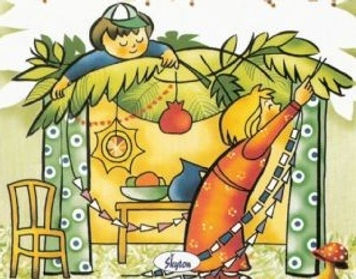PROVERBS 22:6 CHILDREN
Train up a child in the way he should go:
and when he is old, he will not depart from it



Sukkot | סכות |
Feast of Tabernacles / Booths

“Speak to the children of Yisra’el, saying, ‘On the fifteenth day of this seventh month is the Festival of Booths for seven days to יהוה.
Vayikra 23:34
דבר אל־בני ישׂראל לאמר בחמשׁה עשׂר יום לחדשׁ השׁביעי הזה חג הסכות שׁבעת ימים ליהוה׃
Reading:
-
Torah: Exodus 33:12-34:26; Numbers 29:17-34
-
Prophets: Ezekiel 38:18-39:16
-
Book of Ecclisastes
Sukkot, literally Feast of Booths, is commonly translated to English as Feast of Tabernacles, sometimes also as Feast of the Ingathering. During the existence of the Jerusalem Temple it was one of the Three Pilgrimage Festivals n which the Israelites were commanded to perform a pilgrimage to the Temple.
Sukkot marks the end of the harvest time and thus of the agricultural year in the Land of Israel. It is a time commemorating the Exodus and the dependence of the People of Israel on the will of God (Leviticus 23:42-43). It is believed that Yeshua was born during this festival and it is also a shadow of the wedding feast when our Messiah returns.
The holiday lasts seven days in Israel. The first day is a Shabbat High Holy day, where we do not work, but gather together.
The Hebrew word sukkōt is the plural of sukkah, "booth" or "tabernacle", which is a walled structure covered with s'chach(plant material such as overgrowth or palm leaves). A sukkah is the name of the temporary dwelling in which farmers would live during harvesting, a fact connecting to the agricultural significance of the holiday stressed by the Book of Exodus. Throughout the holiday, meals are eaten inside the sukkah and many people sleep there as well.
On each day of the holiday it is mandatory to perform a waving ceremony with the Four Species.
 |
|---|